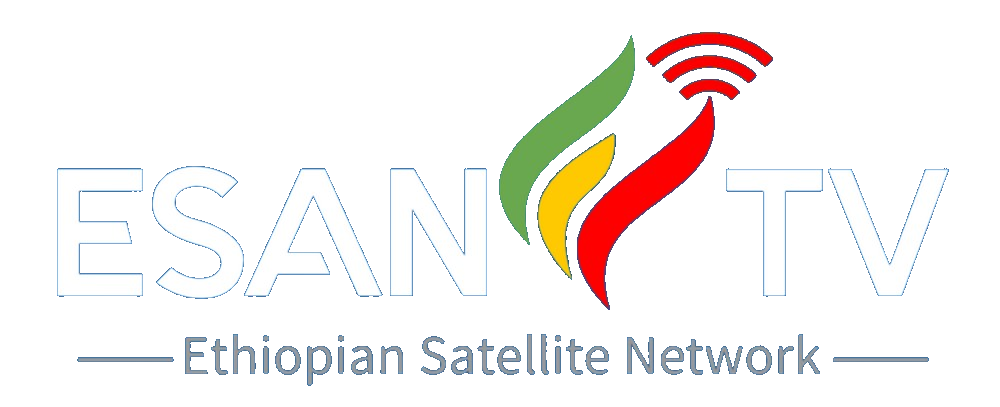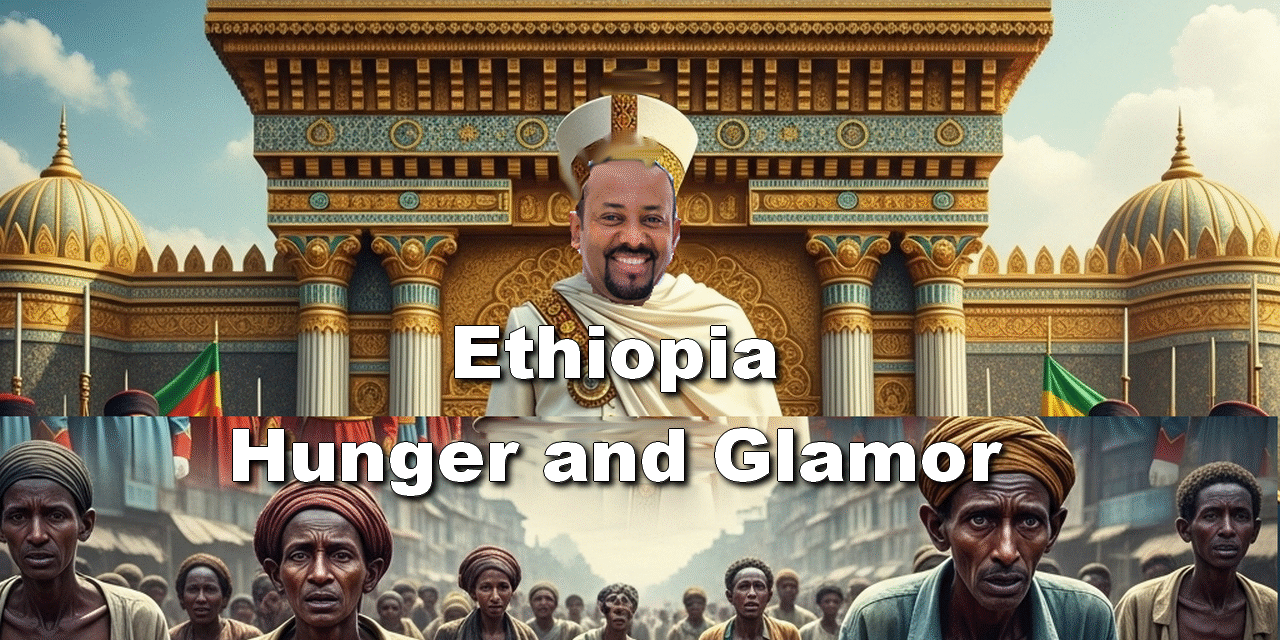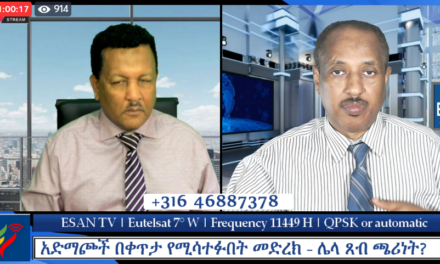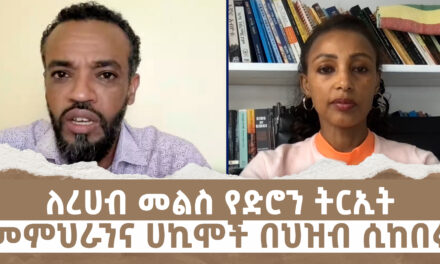Ethiopia, under Abiy Ahmed, is being rocked by a severe political and socio-economic crisis. This is the culmination of a turmoil that began on Ginbot 20 (May 28, 1991). It was TPLF’s victory day, which has now been cancelled as a national holiday. However, the dire situation in the country has significantly worsened since then.
The current system under Abiy Ahmed is just a continuation of the TPLF era, which was ushered in the guise of a radical reform. With merely a change in personnel rather than fundamental shifts in mindset or on the ground, the decadent system has worsened political and economic conditions compared to the previous regime under the TPLF.
Against this political backdrop, a severe crisis is unfolding for professionals, including teachers, healthcare professionals, and civil servants across the country. Teachers and healthcare workers in general, who provide crucial services, have reached a point where they publicly state they cannot afford to live and are facing starvation. This harsh reality is described as a consequence of the situation that began when the TPLF took power in 1991. Abiy Ahmed and his tutelages grew under the care of the TPLF as cadres and accomplices of the regime’s criminal enterprise. That seems to be the reason they are insensitive to the plight of the masses under their oppressive regime.
Despite the severe crisis the nation is facing, Abiy Ahmed is building his fool’s paradise. His priorities are cosmetic, as if he were the owner of a beauty salon. He is spending billions on decorations, colorful drone shows. While tens of millions have been facing the fangs of hunger and many millions are displaced, 9.5 million students are out of school, he is building his “paradise”. The flagship project is a grand palace he is building at a cost of ten billion US dollars. This kind of myopia is the hallmark of his vanity.
Recent findings from a new study by ActionAid underscore the gravity of the situation for these critically essential professionals. The study indicates that a large number of Ethiopian teachers and health care professionals are experiencing worsening financial hardship and deteriorating working conditions. This has led to a significant increase in their desire to leave their professions.
Key findings from the ActionAid study include:
• Ethiopian schools have seen their budgets cut by 50% over the past five years.
• Financial pressure has caused a shortage of basic educational materials.
• All teachers surveyed reported a significant lack of school equipment and learning materials.
• Over 80% of teachers are forced to share limited resources and textbooks.
• 91% of teachers reported worsening working conditions.
• 96% of teachers stated they had not received any professional training in the last three to five years.
• These pressures have led 91% of Ethiopian teachers to express a desire to leave their profession.
Challenges in the health sector are equally severe. Among health professionals surveyed:
• 95% reported a shortage of medical equipment and essential medicines.
• 90% reported serious problems in providing maternal health services.
• All health professionals surveyed felt their income was insufficient.
• Over 75% reported being forced to reduce their family’s food intake due to reduced income.
• Respondents reported high stress levels.
• Lack of professional training opportunities is a major problem, with 100% of health professionals reporting inability to access training.
• As a result, 65% of health professionals expressed a desire to leave their profession.
The study also noted that Ethiopia allocates 7.1% of its budget to health and 23.1% to education, both below international standards. The dire financial state of these professionals means that experienced teachers, even with nine or ten years of experience, may earn a maximum of 10,000 Birr. Attempting to live on this income, cover rent, education for children, and daily expenses is described as extremely difficult, bordering on impossible, “except by magic”. Recent reports have highlighted the stressful struggles, with some university teachers unable to afford rent, resorting to sleeping in student dorms. Others, struggling to cope with the cost of living, are working as day laborers. Government employees unable to afford food have been seen spending lunch breaks in offices or going to churches and mosques instead of eating at home. Many teachers, health professionals, and government workers are also taking on side jobs like driving for ride-hail companies or working in clinics just to survive.
In response to teachers’ concerns, government officials, including Addis Ababa de facto Mayor Adanech Abebie, have met with them. However, the response is often characterized as offering “Manna from heaven” (የተስፋ ዳቦ) rather than concrete solutions. For instance, regarding housing, teachers were told they could become homeowners through a scheme where the city administration provides land and the Commercial Bank provides loans, but they would need to contribute 25% of the cost. This proposal is widely seen as unrealistic and even laughable given their low salaries. The basic question of whether a teacher can save 25% from a 10,000 Birr salary remains unanswered. Furthermore, concerns were raised that even if individuals contribute, they may not ultimately receive housing, as has allegedly happened with condominium projects where contributions were made but the houses were taken over by cadres or sold illicitly. Teachers have also raised questions about promised projects like a teachers’ hospital that were pledged years ago but have not been completed.
The situation is described as a severe crisis with significant consequences for the country’s future. If skilled professionals like doctors and teachers continue to leave their professions or the country, Ethiopia could face a critical shortage of essential service providers. It is noted that Ethiopia already has a very low doctor-to-population ratio (one doctor per 10,000 people), and this crisis could worsen access to healthcare, even in urban areas.
Unlike some issues, the demands of teachers and health professionals are transcedent over ethnic fautlines that have divided and crippled the nation. Uniting Ethiopians across ethnic and religious lines, their struggle is not a matter of luxury but a fight for survival and acceptable living conditions. However, the government is prioritizing intimidation and harassment over addressing legitimate grievances. Many professionals have reportedly been detained and accused of terrorism simply for demanding their basic rights. So many are being fired, and medical students are being dismissed without explanation. The regime is focused on propaganda and suppressing dissent rather than finding real and lasting solutions. It has been nearly two years since Abiy Ahmed declared war against the people of Amhara. With the rise of Fano as a force to be reckoned with, it has been clear and self-evident that endless military campaigns bankrupting the regime are only hastening its downfall.
Change is inevitable and unpredictable. What should be clear to all those struggling to bring about fundamental change is the nature and direction the country needs to take in the aftermath. The current fragmentation poses significant dangers. Every stakeholder must make sincere efforts to mitigate the existential risks the nation faces in the aftermath of state collapse under a dangerously fragmented political landscape.
***
As a satellite broadcast reaching millions of households in Ethiopia, ESAN TV aims to provide comprehensive information on Ethiopia’s political, economic, and social issues, particularly for the Ethiopian public. To continue its 24-hour satellite service and dissemination of information, including reports like this, ESAN TV relies on financial support from viewers through monthly contributions or donations via its website. The need for support is ongoing to cover satellite costs and other operational expenses.
—
Abebe Gellaw is the Co-founder and CEO of the Ethiopian Satellite Network TV (ESAN TV). To support or subscribe ESAN TV, please click here: www.esantv.net/support-us








